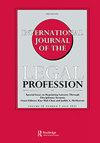编辑
IF 0.9
Q2 LAW
International Journal of the Legal Profession
Pub Date : 2018-09-02
DOI:10.1080/09695958.2018.1503218
引用次数: 0
摘要
Van Rossum在开始这个问题时考虑了法律教育如何处理“后现代性”。这被描述为“一个由不确定性统治的复杂社会,由于技术变革和科学的神秘化以及全球化,它面临着分配责任的挑战”。Van Rossum最后提出了一些初步建议,以应对法律教育的不确定性和变化。其中包括文化意识的发展、批判性反思和“怀疑艺术”。Hendley揭示了俄罗斯法律系毕业生的职业偏好。自1991年以来,法律专业学生的比例增加了五倍,这主要是由于市场的引入。Hendley在决定进入法律专业不同分支和工作的更具体领域之前,将注意力集中在所有法律专业学生身上,首次概述了俄罗斯的法律职业抱负。兼职(通常是实习后)和全职(更年轻,也许更聪明)学生及其愿望之间存在分歧。前者的目标似乎是最终成为声望较低的官员类型的角色;而全日制学生的目标是更多的商业选择。大量可能的律师形式提供了一系列有趣的选择,但对于“西方”的局外人来说,他们最终会走向何方的不确定性程度似乎很熟悉。巴蒂考虑了通过生活史研究女性法律学者的方法挑战。巴蒂主张将法律学者与纯粹的教育工作者、学者或律师区别对待,认为他们的独特角色应该为作品的核心调查提供信息。应该表达一系列的观点,其中应该包括受试者对女权主义和女权主义法律学术的态度。Choroszewicz和Tremblay研究了赫尔辛基和蒙特利尔男性律师的育儿假政策。他们询问,在这两个司法管辖区,男性律师使用陪产假和育儿假是否存在文化和职业障碍。在传统上以男性为主的职业中,仅仅提供法定权利可能是不够的。需要组织解决方案和工作环境中的同伴鼓励,让男性在休假时感到舒适。在法律教育和技能部分,Thomas和Craduck展示了如何在培训中减少倡导者的焦虑。读得好!本文章由计算机程序翻译,如有差异,请以英文原文为准。
Editorial
Van Rossum opens this issue considering how legal education might handle ‘late modernity’. This is described as ‘a complex society ruled by uncertainty that faces the challenge of allocating responsibility’ owing to technical changes and the demystification of science together with globalisation. Van Rossum ends with some initial suggestions for possible adjustments to legal education to deal with the uncertainties and changes. These include the development of cultural awareness, critical reflection and the ‘art of doubt’. Hendley throws light on the career preferences of law Graduates in Russia. The proportion of law students has increased fivefold since 1991 largely as a result of the introduction of the market. By concentrating on all law students before they make decisions to move into more specific areas of the different branches and jobs of the legal profession, Hendley provides for the first time an overview of legal career aspirations in Russia. A division appears between part time (usually post experience) and full time (younger, and perhaps brighter) students and their aspirations. The former seem to aim to end up in official type roles with lower prestige; whereas the full time students are aiming for more commercial options. The large number of possible forms of lawyer provide an interesting set of choices, but the levels of uncertainty about where they will end up seem familiar to outsiders in ‘the West’. Bartie considers the methodological challenges of studying women legal scholars through life history. Bartie argues for treating legal scholars differently from pure educators, scholars or lawyers, suggesting that their unique role should inform the work’s central inquiries. There should be a range of views expressed and these should include the subject’s attitude towards feminism and feminist legal scholarship. Choroszewicz and Tremblay study parental-leave policy for male lawyers in Helsinki and Montreal. They ask if there are cultural and professional barriers to male lawyers’ use of paternity and parental leaves in both jurisdictions. In traditionally male-dominated professions, it may not be enough to provide a statutory right. Organisational solutions and peer encouragement in the work environment will be needed to allow men to feel comfortable taking leave. In the Legal Education and Skills section, Thomas and Craduck show how advocates’ anxiety might be reduced in training. Good reading!
求助全文
通过发布文献求助,成功后即可免费获取论文全文。
去求助

 求助内容:
求助内容: 应助结果提醒方式:
应助结果提醒方式:


